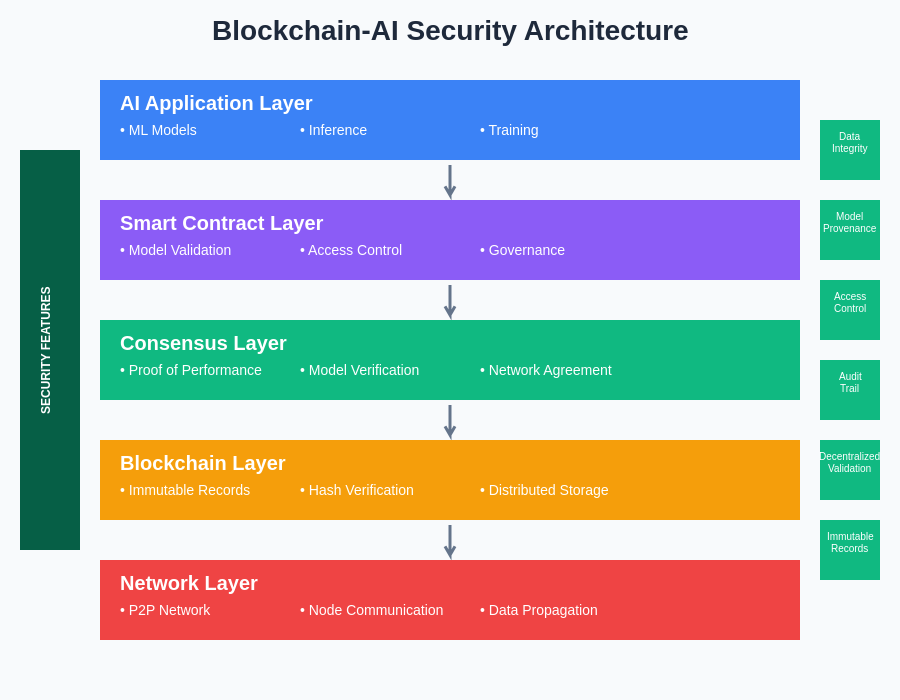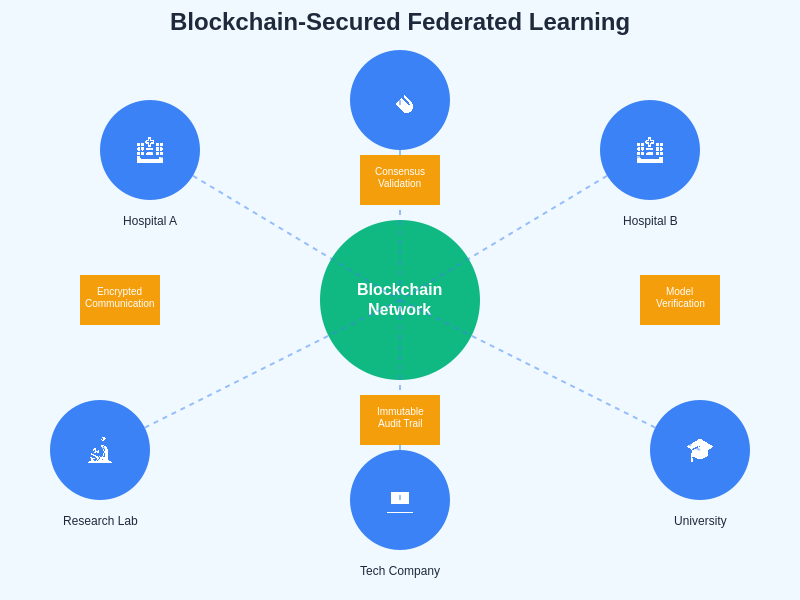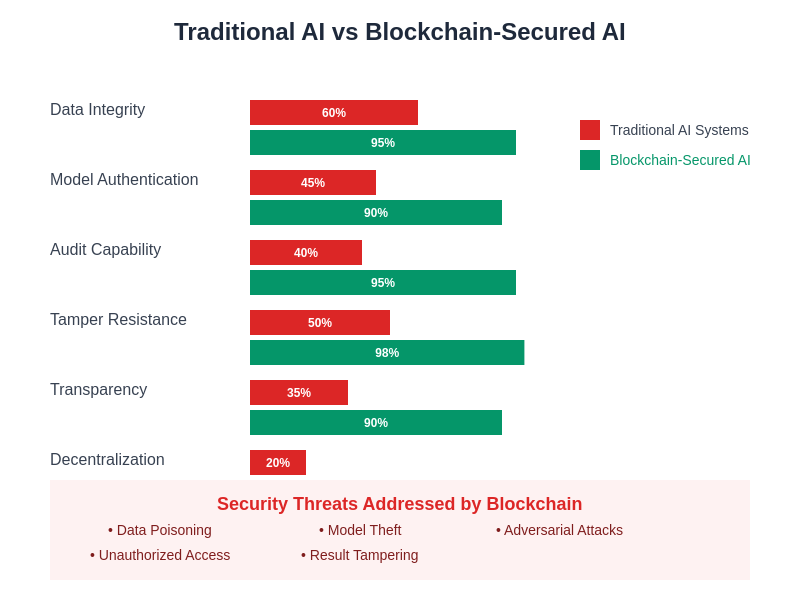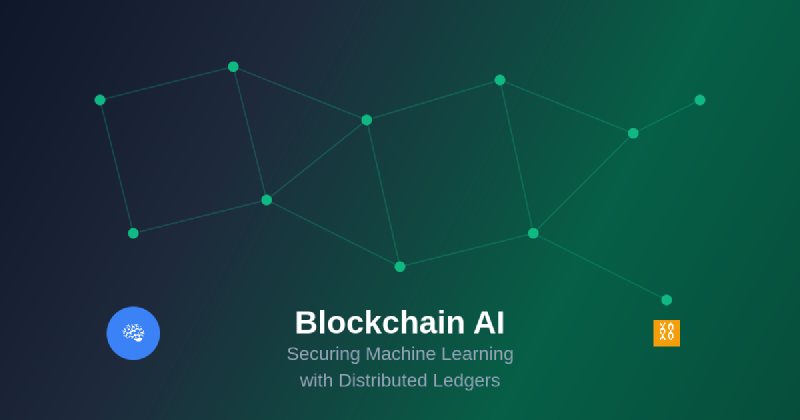The convergence of blockchain technology and artificial intelligence represents one of the most significant paradigm shifts in modern computing, fundamentally transforming how we approach machine learning security, data integrity, and distributed AI systems. As machine learning models become increasingly sophisticated and valuable, the need for robust security mechanisms that can protect intellectual property, ensure data authenticity, and maintain model integrity has never been more critical. Blockchain technology emerges as the ideal solution, providing an immutable, transparent, and decentralized foundation for securing AI systems against tampering, fraud, and unauthorized modifications.
Explore the latest AI security trends to understand how blockchain integration is reshaping the landscape of machine learning security and creating new opportunities for trustworthy AI deployment. The marriage of these two revolutionary technologies promises to unlock unprecedented levels of security, transparency, and decentralization in artificial intelligence applications across diverse industries and use cases.
The Security Imperative in Modern AI Systems
Contemporary machine learning systems face multifaceted security challenges that traditional centralized approaches struggle to address effectively. These challenges range from data poisoning attacks and model inversion threats to intellectual property theft and unauthorized model modifications. The distributed nature of modern AI development, where multiple parties contribute data, computational resources, and expertise, creates additional vulnerabilities that can compromise the entire system’s integrity and reliability.
Blockchain technology addresses these fundamental security concerns by providing a tamper-resistant foundation for AI operations. Through cryptographic hashing, distributed consensus mechanisms, and immutable record-keeping, blockchain creates an environment where every aspect of the machine learning pipeline can be verified, audited, and trusted. This transformation is particularly crucial as AI systems increasingly handle sensitive data, make critical decisions, and operate in high-stakes environments where security breaches can have catastrophic consequences.
The integration of blockchain with AI systems also addresses the growing concern about model authenticity and provenance. In an era where deep fake technology and adversarial attacks can manipulate AI outputs, establishing a verifiable chain of custody for models, training data, and inference results becomes essential for maintaining trust in AI systems. Blockchain provides this verification mechanism through its inherent transparency and immutability characteristics.

The layered architecture of blockchain-secured AI systems demonstrates how multiple security mechanisms work together to create a comprehensive protection framework. Each layer provides specific security guarantees while maintaining interoperability with other system components, creating a robust foundation for trustworthy AI deployment.
Distributed Ledger Foundations for AI Security
The fundamental architecture of blockchain technology aligns perfectly with the security requirements of modern AI systems. Distributed ledgers create a decentralized network where no single entity controls the entire system, eliminating single points of failure that could compromise AI security. This distributed approach ensures that machine learning models, training data, and computational processes are protected against both external attacks and internal threats from malicious actors within the system.
Smart contracts play a pivotal role in this security framework by automating the enforcement of security policies and access controls without requiring human intervention. These self-executing contracts can govern how AI models are trained, validated, and deployed, ensuring that security protocols are consistently applied across the entire network. The programmable nature of smart contracts enables the implementation of sophisticated security mechanisms that can adapt to different threat scenarios and compliance requirements.
Enhance your AI development with advanced tools like Claude to leverage cutting-edge capabilities in blockchain-AI integration and secure machine learning development. The combination of blockchain infrastructure and advanced AI assistants creates a powerful ecosystem for developing secure, transparent, and auditable AI systems.
Immutable Data Integrity and Model Provenance
One of the most significant advantages of blockchain integration in AI systems is the establishment of immutable data integrity throughout the entire machine learning lifecycle. Every piece of training data, model parameter update, and inference result can be cryptographically hashed and stored on the blockchain, creating an unalterable record of the system’s evolution. This immutability ensures that any unauthorized modifications to the data or model can be immediately detected and traced back to their source.
The concept of model provenance becomes particularly important in federated learning environments where multiple parties contribute to model training without sharing their raw data. Blockchain technology enables the creation of a transparent audit trail that documents each contribution to the model’s development, including the source of training data, the computational resources used, and the specific algorithms employed. This level of transparency builds trust among participants and enables regulatory compliance in industries with strict data governance requirements.
The verification of data integrity extends beyond the initial training phase to encompass the entire operational lifetime of AI models. Real-time validation of input data, model parameters, and output results ensures that deployed models maintain their integrity and continue to operate within expected parameters. Any deviations from established baselines can trigger automatic responses, including model rollbacks or security alerts, protecting the system from various forms of attack or degradation.
Decentralized AI Marketplaces and Model Exchange
Blockchain technology has enabled the emergence of decentralized AI marketplaces where researchers, developers, and organizations can securely share, trade, and collaborate on machine learning models and datasets. These platforms leverage smart contracts to automate licensing agreements, payment processing, and intellectual property protection, creating a trustworthy environment for AI asset exchange. The decentralized nature of these marketplaces eliminates the need for centralized intermediaries while maintaining high levels of security and transparency.
The tokenization of AI assets through blockchain enables new economic models for AI development and deployment. Machine learning models can be represented as non-fungible tokens (NFTs) that encapsulate their training history, performance metrics, and usage rights. This tokenization facilitates the creation of verifiable ownership records and enables sophisticated revenue-sharing mechanisms for collaborative AI development projects. Contributors to model training can receive proportional compensation based on their verified contributions to the system.
Privacy-preserving technologies integrated with blockchain platforms enable secure model sharing without revealing sensitive information about the underlying training data or proprietary algorithms. Techniques such as zero-knowledge proofs and homomorphic encryption allow parties to verify model performance and integrity without accessing the actual model parameters or training procedures. This privacy preservation is crucial for commercial AI applications where intellectual property protection is paramount.
Federated Learning and Distributed Training Security
The combination of blockchain technology with federated learning creates a powerful framework for secure, distributed machine learning that protects participant privacy while ensuring model integrity. Blockchain serves as a coordination layer that manages participant authentication, contribution verification, and consensus mechanisms without requiring a central authority. This decentralized approach eliminates potential single points of failure and reduces the risk of coordinated attacks on the federated learning system.
Discover comprehensive research capabilities with Perplexity for exploring advanced federated learning architectures and blockchain integration strategies. The intersection of these technologies creates opportunities for innovative approaches to distributed AI that prioritize both performance and security.
Smart contracts automate the federated learning process by defining participation rules, contribution requirements, and reward mechanisms. These contracts ensure that all participants follow established protocols for data preparation, model training, and result submission. The automated nature of smart contract execution eliminates the potential for human error or manipulation in the coordination of distributed training processes.
The verification of participant contributions in federated learning scenarios becomes straightforward through blockchain’s transparency and immutability features. Each training round’s results are cryptographically verified and recorded on the blockchain, creating an auditable trail of the model’s development. This verification process ensures that malicious participants cannot inject poisoned updates or manipulate the training process without detection.

The federated learning framework secured by blockchain technology enables multiple organizations to collaborate on AI model development while maintaining data privacy and security. The blockchain network serves as a trusted coordinator that verifies contributions, manages consensus, and ensures all participants follow established protocols for secure collaborative machine learning.
Consensus Mechanisms for AI Model Validation
The adaptation of blockchain consensus mechanisms for AI model validation represents a significant innovation in ensuring model reliability and accuracy. Unlike traditional blockchain applications that focus on transaction validation, AI-blockchain systems implement consensus mechanisms specifically designed to evaluate model performance, detect anomalies, and reach agreement on model updates. These specialized consensus algorithms consider factors such as model accuracy, computational efficiency, and robustness to adversarial attacks.
Proof-of-performance consensus mechanisms evaluate AI models based on their ability to solve specific benchmark problems or demonstrate superior performance on validation datasets. This approach ensures that only high-quality models are accepted by the network and that model updates improve overall system performance. The competitive nature of proof-of-performance consensus encourages continuous innovation and improvement in AI model development.
Stake-based consensus mechanisms for AI validation allow participants to stake tokens based on their confidence in specific model predictions or updates. This economic incentive aligns participant interests with system performance and creates natural mechanisms for identifying and penalizing malicious actors. The staking mechanism also provides a way to weight contributions based on participant expertise and historical performance, improving the overall quality of consensus decisions.
Smart Contracts for Automated AI Governance
The implementation of smart contracts for AI governance creates self-executing systems that can manage complex AI operations without human intervention while maintaining strict adherence to predefined policies and regulations. These automated governance systems can handle everything from data access permissions and model deployment approvals to compliance monitoring and incident response procedures. The programmable nature of smart contracts enables the creation of sophisticated governance frameworks that can adapt to changing regulatory requirements and organizational policies.
Automated compliance monitoring through smart contracts ensures that AI systems continuously meet regulatory requirements without requiring manual oversight. These contracts can monitor data usage patterns, model performance metrics, and operational parameters to detect potential compliance violations. When violations are detected, smart contracts can automatically trigger corrective actions such as model retraining, data anonymization, or system shutdowns, ensuring rapid response to compliance issues.
The governance of AI model updates and deployments can be automated through multi-signature smart contracts that require approval from multiple stakeholders before changes are implemented. This distributed approval process prevents unauthorized modifications while ensuring that legitimate updates can be deployed efficiently. The transparency of smart contract execution provides a complete audit trail of all governance decisions and their rationale.
Privacy-Preserving AI with Cryptographic Protocols
The integration of advanced cryptographic protocols with blockchain technology enables the development of privacy-preserving AI systems that can perform machine learning tasks on encrypted data without revealing sensitive information. Homomorphic encryption allows computations to be performed directly on encrypted data, enabling AI models to process sensitive information while maintaining privacy throughout the computation process. When combined with blockchain’s immutable record-keeping, this creates a powerful platform for privacy-preserving AI applications.
Zero-knowledge proof systems enable AI models to demonstrate their performance and integrity without revealing the underlying algorithms, training data, or model parameters. This capability is particularly valuable for commercial AI applications where intellectual property protection is crucial. Organizations can prove that their models meet specific performance criteria or comply with regulatory requirements without disclosing proprietary information that could be exploited by competitors.
Secure multi-party computation protocols integrated with blockchain enable collaborative AI development where multiple parties can jointly train models using their private datasets without sharing the raw data. The blockchain serves as a coordination layer that manages the computation process, verifies participant contributions, and ensures fair compensation for data and computational resources. This approach enables the creation of powerful AI models that benefit from diverse datasets while maintaining strict privacy controls.
Tokenization and Incentivization of AI Development
The tokenization of AI development processes through blockchain technology creates new economic models that incentivize high-quality contributions to machine learning systems. Developers, data providers, and computational resource contributors can earn tokens based on the verified value of their contributions to AI model development and deployment. This token-based economy creates market-driven incentives for improving AI system performance and security.
Data contributors can be compensated through token rewards based on the quality, uniqueness, and utility of their datasets for training AI models. Blockchain’s transparent tracking of data usage and model performance enables fair and accurate compensation that reflects the true value of data contributions. This incentivization mechanism encourages the sharing of high-quality datasets while protecting contributor rights and privacy.
Computational resource providers in distributed AI networks can earn tokens by contributing processing power, storage capacity, or specialized hardware for AI training and inference tasks. The blockchain tracks resource utilization, verifies computational contributions, and automatically distributes rewards based on predefined algorithms. This decentralized approach to computational resource management reduces the cost of AI development while ensuring fair compensation for resource providers.
Industry Applications and Use Cases
The healthcare industry has emerged as a leading adopter of blockchain-AI integration, particularly for applications requiring strict privacy controls and regulatory compliance. Medical AI systems benefit from blockchain’s ability to maintain patient data privacy while enabling collaborative research and model development across multiple institutions. The immutable audit trail provided by blockchain technology supports regulatory compliance requirements while enabling the sharing of insights and model improvements across the healthcare ecosystem.
Financial services organizations leverage blockchain-AI systems for fraud detection, risk assessment, and algorithmic trading applications where model integrity and auditability are critical requirements. The transparency and immutability of blockchain records enable regulatory compliance while supporting the development of sophisticated AI models that can process sensitive financial data. Smart contracts automate compliance monitoring and ensure that AI systems operate within established risk parameters and regulatory guidelines.
Supply chain management represents another significant application area where blockchain-AI integration provides value through enhanced transparency, traceability, and predictive analytics. AI models analyze supply chain data stored on blockchain networks to optimize logistics, predict disruptions, and ensure product authenticity. The combination of blockchain’s immutable record-keeping with AI’s predictive capabilities creates powerful tools for supply chain optimization and risk management.
Technical Implementation Challenges
The integration of blockchain technology with AI systems presents several technical challenges that must be addressed to achieve optimal performance and security. Scalability remains a primary concern, as traditional blockchain networks may not have sufficient throughput to handle the high-frequency operations typical of AI applications. Layer-2 scaling solutions, sharding techniques, and alternative consensus mechanisms are being developed to address these performance limitations while maintaining security guarantees.
Interoperability between different blockchain platforms and AI frameworks requires the development of standardized protocols and interfaces that enable seamless integration. The diversity of blockchain implementations and AI development tools creates complexity in building cohesive systems that can operate across different technology stacks. Industry standardization efforts are addressing these challenges through the development of common APIs and data formats.
Energy consumption considerations become particularly important when combining the computational requirements of AI training with the energy-intensive nature of blockchain consensus mechanisms. Sustainable approaches to blockchain-AI integration focus on energy-efficient consensus algorithms, optimized computational resources, and renewable energy sources for network operations. The development of green blockchain technologies is essential for the long-term viability of large-scale blockchain-AI systems.
Regulatory Compliance and Legal Frameworks
The regulatory landscape for blockchain-AI systems continues to evolve as governments and international organizations develop frameworks for governing these emerging technologies. Compliance requirements vary significantly across jurisdictions and industries, creating challenges for organizations deploying blockchain-AI systems globally. The immutable nature of blockchain records can support compliance efforts by providing transparent audit trails, but it also creates challenges when regulations require data deletion or modification rights.
Privacy regulations such as GDPR and CCPA create specific requirements for blockchain-AI systems regarding data processing, storage, and individual rights. The tension between blockchain’s immutability and privacy rights requiring data deletion necessitates careful system design that balances regulatory compliance with technological capabilities. Innovative approaches such as off-chain data storage with on-chain references are being developed to address these challenges.
International cooperation on blockchain-AI governance is essential for creating consistent regulatory frameworks that support innovation while protecting individual rights and national security interests. Standards organizations and regulatory bodies are working to develop harmonized approaches to blockchain-AI governance that enable cross-border collaboration while maintaining appropriate oversight and control mechanisms.

The comprehensive security advantages of blockchain-integrated AI systems become evident when compared to traditional centralized approaches. Blockchain technology provides substantial improvements across all critical security metrics, including data integrity, model authentication, audit capabilities, tamper resistance, transparency, and decentralization, creating a significantly more secure foundation for AI operations.
Future Evolution and Technological Convergence
The future of blockchain-AI integration promises even more sophisticated applications as both technologies continue to evolve and mature. Quantum-resistant cryptographic protocols are being developed to ensure long-term security as quantum computing capabilities advance. These quantum-safe blockchain systems will provide the foundation for AI applications that require long-term data integrity and security guarantees.
The convergence of blockchain, AI, and Internet of Things (IoT) technologies creates opportunities for autonomous systems that can operate with minimal human intervention while maintaining security and transparency. Smart cities, autonomous vehicles, and industrial automation systems will benefit from the combination of AI decision-making capabilities with blockchain’s security and coordination features.
Edge computing integration with blockchain-AI systems enables decentralized intelligence that can operate efficiently in resource-constrained environments. This convergence supports applications such as autonomous drones, smart sensors, and mobile AI applications that require real-time decision-making capabilities while maintaining connection to secure blockchain networks for coordination and verification.
Economic Impact and Market Transformation
The integration of blockchain technology with AI systems is creating new economic opportunities and transforming traditional business models across multiple industries. The tokenization of AI assets enables new forms of investment and value creation that were previously impossible with centralized AI development approaches. Investors can participate in AI development projects through token ownership, receiving returns based on model performance and usage metrics.
Decentralized AI marketplaces are reducing barriers to entry for AI development by enabling smaller organizations and individual developers to access high-quality datasets, computational resources, and expertise through token-based transactions. This democratization of AI development resources is accelerating innovation and creating opportunities for breakthrough applications that might not have been possible under traditional centralized development models.
The emergence of AI-driven autonomous economic agents powered by blockchain technology represents a fundamental shift toward self-managing economic systems. These autonomous agents can participate in markets, negotiate contracts, and provide services without human intervention while maintaining security and transparency through blockchain integration. This evolution toward autonomous economic systems has profound implications for future business models and economic structures.
Conclusion and Strategic Implications
The integration of blockchain technology with artificial intelligence represents a transformative convergence that addresses fundamental challenges in AI security, transparency, and decentralization. As organizations increasingly rely on AI systems for critical decision-making and operations, the security guarantees provided by blockchain technology become essential for maintaining trust and ensuring system integrity. The combination of these technologies creates opportunities for innovative applications that were previously impossible with either technology alone.
The strategic implications of blockchain-AI integration extend beyond technical capabilities to encompass new business models, regulatory approaches, and economic structures. Organizations that successfully leverage these technologies will gain competitive advantages through improved security, enhanced transparency, and access to decentralized resources and markets. The early adoption of blockchain-AI systems positions organizations to capitalize on emerging opportunities while building robust foundations for future technological developments.
The continued evolution of blockchain-AI integration will require ongoing collaboration between technologists, regulators, and industry stakeholders to address technical challenges, establish governance frameworks, and ensure that the benefits of these technologies are realized while mitigating potential risks. The future success of blockchain-AI systems depends on the development of sustainable, scalable, and secure implementations that can support the growing demands of modern AI applications while maintaining the principles of decentralization and transparency that make blockchain technology valuable.
Disclaimer
This article is for informational purposes only and does not constitute professional advice regarding blockchain technology, artificial intelligence implementation, or investment strategies. The views expressed are based on current understanding of emerging technologies and their potential applications. Readers should conduct thorough research and consult with qualified professionals before implementing blockchain-AI systems or making investment decisions. The rapidly evolving nature of these technologies means that current information may become outdated as new developments emerge.
